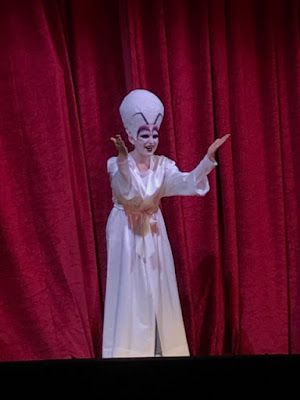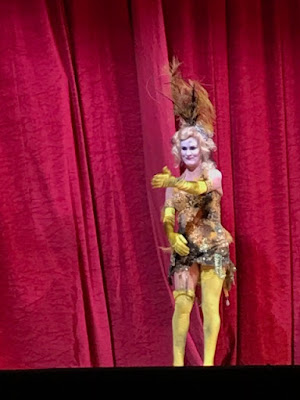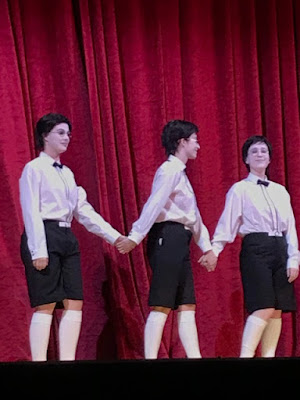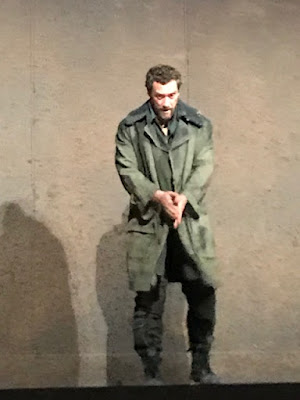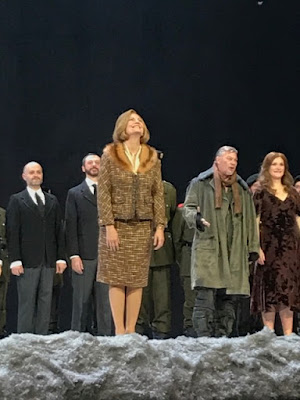(Review in English below)
(texto de
wagner_fanatic e fanatico_um. Fotografias de wagner_fanatic)
Uma Flauta Mágica espectacular! Muito diferente do habitual, sempre especial. A
encenação de Suzanne Andrade,
Barrie Kosky
presta uma homenagem ao cinema mudo do início do século passado e está muito
bem conseguida. É verdadeiramente original, exige uma precisão enorme dos
cantores para aparecerem nos momentos certos, a fazerem os gestos certos para
que tudo o que é constantemente projectado se enquadre na perfeição, o que
aconteceu. É um daqueles espectáculos que tem que ser visto, não se consegue
descrever.
Assistimos
a duas récitas com artistas diferentes.
O maestro Ivo Bolton na sua
tradição e qualidade irrepreensível esteve muito bem numa das récitas e menos
bem na outra, onde imprimiu um ritmo excessivamente lento na abertura. A
Orquestra sublime ou nem tanto, numa das récitas com várias entradas tardias de
vários instrumentos, sobretudo no início.
O Tamino foi
excepcional nas duas récitas, interpretado por dois cantores diferentes.
Stanislas de Barbeyrac foi brutal! Paul
Appleby foi excelente, dicção perfeita, voz muito bonita e um volume
assinalável.
Andreas Wolf foi o
Papageno nas 2 récitas. Foi excelente, mas com ligeiro vibrato.
A Raínha da Noite foi cantada de forma superior pelas duas intérpretes,
Aleksandra Olczyk com um vozeirão brutal e
afinação sublime, e Rocío Pérez que, tenho mostrado
alguma fragilidade na coloratujra da primeira intervenção, foi irrepreensível
na sua áeria de referência.
A Pamina da Olga Peretyatko esteve fantástica, com
os ataques agudos límpidos, e a da Anett Fritsch foi espectacular, de voz
sempre afinada, timbre bonito e uma interpretação sólida, sempre sobre a
orquestra.
O Monostatos do Mikeldi Atxalandabaso foi correcto e interessante nas
duas récitas.
Foi na
interpretaçãoo do Sarastro que as diferenças foram acentuadas. Um dos cantores
(Andrea
Mastroni) foi excelente, de voz cavernosa e bem audível, como se deseja neste papel,
enquanto o outro (Rafal Siwek) foi fraco, com francas dificuldades no
registo mais grave e uma voz frequentemente afogada pela orquestra.
Nos papéis secundários
houve uniformidade na qualidade elevada de todos: Ruth Rosique como Papagena,
Elena
Copons, Gemma Coma-Alabert e Marie-Luise
Dressen nas três damas,
e os três rapazes (que eram raparigas).
****
THE MAGIC
FLUTE / DIE ZAUBERFLÖTE, Teatro Real, Madrid, February 2020
(text by
wagner_fanatic and fanatic_um. Photographs by wagner_fanatic)
A
spectacular Magic Flute! Very different from the usual, always special. The
staging by Suzanne Andrade, Barrie Kosky pays homage to the silent cinema of
the beginning of the last century and is very well. It is truly original, it
requires an enormous precision of the singers to appear at the right moments,
to make the right gestures so that everything that is constantly projected fits
perfectly, what happened. It is one of those shows that has to be seen, it
cannot be described.
We watched
two performances with different artists.
Maestro Ivo Bolton in his tradition and
impeccable quality did very well in one of the shlows and less well in the
other, where he imposed an excessively slow pace in the opening. The Orchestra was
sublime or not so, in one of the recitals with several late entries of various
instruments, especially at the beginning.
Tamino was
exceptional in both performances, performed by two different singers.
Stanislas de Barbeyrac was brutal! Paul Appleby was excellent, perfect diction, very beautiful voice
and a remarkable volume.
Andreas Wolf was Papageno in the 2 performances. He was
excellent, but with a slight vibrato.
The Queen
of the Night was sung in a superior way by the two interpreters,
Aleksandra Olczyk with a brutal loud voice and sublime tuning,
and Rocío Pérez who, after having
shown some fragility in the coloratura on the first intervention, was irreproachable
in her reference area.
Olga Peretyatko's Pamina was fantastic, with clear, high-pitched
attacks, and Anett Fritsch was
spectacular, her voice was always in tune, beautiful timbre and a solid
interpretation, always over the orchestra.
Monostatos
by Mikeldi Atxalandabaso was correct
and interesting in both shows.
It was in
the interpretation of Sarastro that the differences were accentuated. One of
the singers (Andrea Mastroni) was excellent,
with a cavernous and very audible, voice as is desired in this role, while the
other (Rafal Siwek) was weak, with difficulties
in the most low register and a voice often drowned by the orchestra.
In the
supporting roles there was uniformity in the high quality of all: Ruth Rosique as Papagena, Elena Copons, Gemma Coma-Alabert and Marie-Luise Dressen in the three ladies,
and the three boys (who were girls).
****








